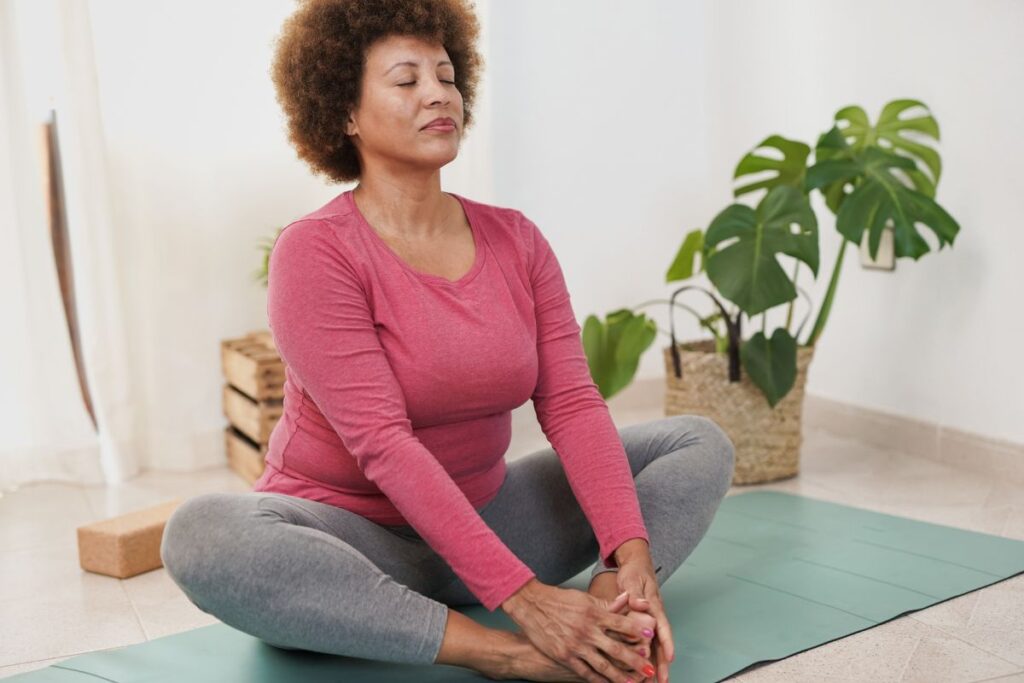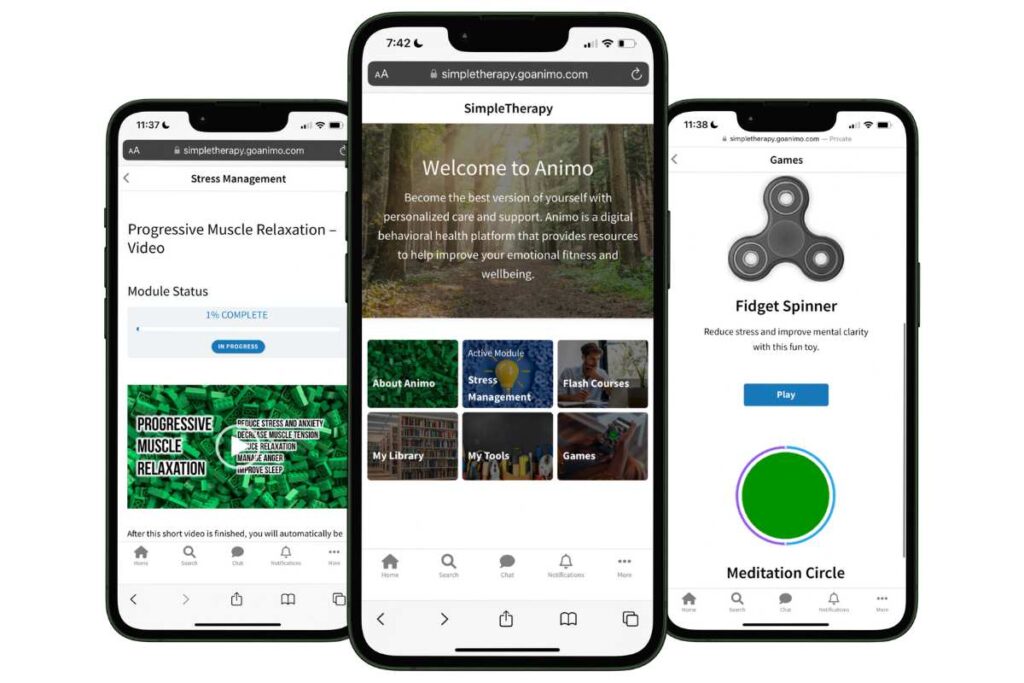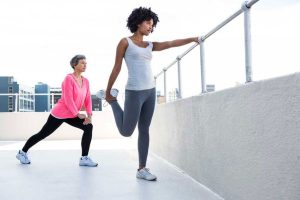Change is inevitable, but during the menopause journey, it can feel overwhelming because so much can happen at once. You may be experiencing hair loss, hot flashes, sleeplessness, weight gain, and many more symptoms. Even though they’re common, it doesn’t make life any easier when going through them. Accepting and managing all this change can be challenging, especially when you consider many women+ may find support lacking at work, at home, at the doctor’s office, and in society as a whole. We get it! But what if we told you that no matter what you’re going through, there’s a tool that can improve your day-to-day life? Enter the power of a positive mindset.
Mindset is everything
At pausitive health, we recognize the menopause journey is often tough for many women+ and can impact their self-esteem. But, we also believe in the power of positivity – hence our name.
The only constant in life is change.
~ Heraclitus
Yes, change is inevitable, but how we think about it can also impact how we experience it. And in turn, our thoughts can affect the severity and duration of menopausal symptoms. In fact, a systematic review of 10 studies found that “women with more negative attitudes towards menopause, in general, reported more symptoms during the menopausal transition.”
Another study noted that women with a more positive attitude tended to have a more positive body image and less depression. And in some countries and cultures, there is not even a word for menopause, while in others, the word for menopause means transformation/renewal/freedom.
It’s important to focus on your mindset as much as any individual symptom, especially since the emotional symptoms can start early – long before a hot flash or a sleepless night.
Time and again, studies find that women in perimenopause and menopause are at an increased risk for mental health issues, including depression, anxiety, and body dissatisfaction.
While you may be familiar with general recommendations to cultivate holistic health habits such as sufficient, high-quality sleep, regular physical activity, and “food as medicine,” mindset is another (big) piece of the puzzle.
It can help you make a change for the better!

What’s your mindset?
Before we dive into its benefits, let’s define what mindset is. The two most-used terms about mindset were coined by Carol Dweck, PhD, a professor of psychology at Stanford University. In her book Mindset: The New Psychology of Success, she differentiates between a growth mindset and a fixed mindset.
Those with a growth mindset believe that change is possible.
Those with a fixed mindset believe they can’t change their situation or outcome.
When viewed through the lens of menopause, some women might feel hopelessness and dread, whereas others embrace this new stage and look for ways to cope with any challenges they may face during this life transition.
Which mindset do you have?
Ultimately, those with a growth mindset are more motivated to problem-solve—and, therefore, more likely to find solutions.
But, even if you have a fixed mindset, you have the power to make a change. First, let’s explore why you may feel one way or another.
Mindset varies across cultures
Exploring your background can help you understand why you might feel the way you do about menopause or experience the journey. But no matter where you’ve started, it’s never too late to make positive mindset shifts.
Whatever attitudes you hold about menopause, there’s a good chance they were influenced by your life circumstances and lived experiences.
In one study of 16,000 women, researchers found that women’s relationships to menopause varied across racial and even ethnic groups within a given race.
- African American women, for example, often have a significantly more positive outlook than Chinese American and Japanese American women. From their perspective, menopausal symptoms may pale in comparison to the negative, multigenerational impacts of systemic racism in all aspects of daily life.
- While Hispanic women in some studies did not openly discuss the menopause transition, they described a cultural view embracing rest and relaxation during “la cambia vida.”
- In Native communities, postmenopausal women are often seen as sources of wisdom, and their stature may increase within their group.
Circumstances can also influence mindset differences across race and ethnicity. For example, Black women+ may reach menopause earlier than other racial groups and tend to have the longest journey duration.
Hispanic women+/Latinas are more likely to experience genitourinary syndrome of menopause (GSM) – vaginal dryness, painful penetrative sex, frequent UTIs, urinary urgency, urinary frequency, vaginal itchiness, loss of libido, and difficulty having an orgasm – than their white counterparts.
In some instances, social determinants of health (SDOH), such as socioeconomic status, education level, exposure to environmental toxins, and access to healthy food and safe neighborhoods, may contribute to these findings in communities of color, who historically have been disadvantaged by the myriad and far-reaching repercussions of racism, bias/discrimination, and colonialism (in addition to sexism and gender disparities).
How to change your mindset
We might understand the “what” and “why” of a positive mindset, but how can we develop one in our own lives? While a mindset shift won’t happen overnight, the steps to get there are within our control.
1. Reframing thoughts
Having a positive mindset surrounding menopause does not mean discounting the difficulties. Although they may sometimes/often be minimized, dismissed, or even ignored, as women+ navigate the healthcare system the symptoms and stressors that come with the journey aren’t “all in your head.”
Reframing the situation requires a “both/and” mentality: acknowledging what you don’t like and seizing the opportunity to learn how to care for yourself in this new phase. You can not only survive but thrive!
One simple shift is to reframe “stressors” as “challenges.”
In the Seattle Midlife Women’s Health Study, participants identified difficulties, including health problems, racism, family problems, work-related issues, deaths, frustrated goal attainment, and financial concerns. But not all women experienced them as stressors or stimuli that place real or perceived demands on the body, emotions, mind, or spirit.
Instead, they saw their problems as challenges: experiences that require great physical and mental effort but can be faced with strength and determination.
Some women have a growth mindset about menopause, and others have a fixed mindset. So, just because two women face the same difficulties, their mindsets can change their relative experiences and impact their ability to cope.
Reframing has real-life implications. Remember the study that found women+ with a more positive attitude toward menopause reported fewer symptoms?
Another study found women who “expect” difficulties during menopause have a higher risk of experiencing symptoms.
Ways menopause can be positive
It’s not a matter of convincing yourself to believe things that aren’t true. Despite the drawbacks often associated with menopause in American culture, this life stage does not have to be dreaded. Take time to reflect on the potential benefits this time can bring, and, in the meantime, here are some points to help inspire you:
Newfound wisdom
By the time most women+ reach menopause, they have 50-plus years of experience under their belts. This comes with the confidence to know what they truly want from relationships, work, and lifestyle and sometimes a greater ability to steer clear of what doesn’t serve them.
While you might not have chosen some of the changes inherent with age, think about the powerful ways you’ve grown in the years leading up to the menopause journey. Embrace your role as a source of trusted advice for yourself, your loved ones, and your community.
A renewed sense of purpose
Roles change throughout our lives. Maybe you’ve been promoted, moved to the senior ranks of an organization, switched jobs/careers, or retired. For those with kids, children may be growing less dependent or have left the nest. But “different” change can be a good thing.
Take time to reevaluate how you want to spend your time. What activities inspire you? What would you love to take on with a seasoned resume or extra time? The clearer you are about your short and long-term goals, the more direction —and excitement —you’ll have for the road ahead.
Sex without fear of pregnancy
Many women have taken pains to avoid becoming pregnant since they were first sexually active. But with menopause, you can let go of anxiety that may have made sex less enjoyable.
This freedom does come with qualifiers, however. First, confirm with a doctor that you’re truly in menopause before ditching your preferred birth control. And no matter what stage of life you’re in, always take care to protect yourself against sexually transmitted infections (STIs)—CDC data from the last ten years shows that rates of STIs have risen steeply in adults 55+.
No PMS or period symptoms
Quite literally, menopause means “the ceasing of menstruation.” 3 in 4 women experience PMS and period symptoms, including fatigue, depression, bloating, cramping, and heavy bleeding, for which menopause can bring welcome relief. But during the post-menopause stage, even tedious logistics—tracking your cycle, remembering tampons and pads—become things of the past.
But note that during perimenopause (the transition into menopause), PMS may worsen, and your periods may change, e.g., heavier bleeding, clots, erratic frequency, and spotting, as your estrogen levels begin to shift.
Increased confidence
By the time you reach menopause, you’ve been you for a while. Take stock of what you like about yourself: What brings you joy? How do you light up a room? When do you feel most empowered? A commitment to your values and identity can help you put others’ opinions in perspective. Some people will always judge, but wisdom helps you care less and enjoy more of life on your terms.
Greater clarity around your priorities
While we’re at it, when your eyes are on your own path, you’re also better able to see what’s really important to you. Instead of being swayed by other people’s standards, you can clarify your values and priorities.
A stronger sense of power and control
With wisdom and experience also comes power. In the corporate workplace, for example, many employees reach executive roles in their 40s or 50s. Especially at a time when more women are landing senior leadership roles, the stereotype that menopause is the end of the road is starting to shift. Public figures, for example, are speaking up about menopause and embracing their influential societal roles to help dispel the stigma and taboo so often present. In your own circles, sharing your experiences can help you and others celebrate this stage of life.
Taking control can also help you secure the menopause treatment you need. Your doctor might not tell you about all the options for care—African American women, for example, are less likely to receive a recommendation for hormonal therapy (HT), even though they often experience more severe symptoms and over a longer period of time. It’s incumbent on you to educate yourself, learn all your options, advocate for the best fit for you, and take action to combat health disparities and medical gaslighting. Make a change for the better!
Reflect on the ways menopause can be a positive light in your life, and start to reframe your thoughts on the journey.
Start with a thought or two a day and gradually build up. At first, it may take work to change your mindset. With practice, it will become more automatic.

2. Practice mindfulness
When you think about “mindset,” another concept that can go hand in hand is mindfulness. While these concepts are distinct, both can benefit emotional and mental health during the menopause journey.
Mindset is your way of thinking, and mindfulness helps create space to notice how you feel about your thinking but without the emotional baggage that can bog you down or send you spiraling up.
Jon Kabat-Zinn, often called the “father of mindfulness” and the founder of the Mindfulness-Based Stress Reduction (MBSR) Program at the University of Massachusetts Medical Center, describes mindfulness as “awareness by paying attention in the present moment non-judgmentally as if it really mattered.”
A mindfulness practice provides strategies to increase awareness of your thoughts and feelings without reacting to them.
The ability to let go can help reduce mental and physical stress and increase your contentment, openness, and feeling of being grounded. It’s been shown to positively impact health issues, including chronic pain, anxiety, depression, cancer, chronic disease, work and family emotional stress, eating disorders, heart disease, and insomnia.
One of the best parts about mindfulness is that, as pronounced as its benefits may be, it’s available to everyone – no expensive equipment or time-off needed.
Breathe. It’s an easy practice you can try right now, wherever you are. Even just 1 to 5 minutes of conscious breathing can refocus your day.
Other ways to practice mindfulness include yoga, tai chi, and meditation. And exercise can be practiced mindfully.
3. Start a gratitude practice
Gratitude is another tool to help shift your mindset towards a more positive outlook.
It’s a state of mind where you focus on the blessings in your life and express gratefulness to others. Gratitude has multifold benefits for health, happiness, and relationships.
In menopause, it’s even been shown to reduce vasomotor symptoms (hot flashes, night sweats, and palpitations), aka VSMs.
When you practice gratitude, your brain releases two important hormones and neurotransmitters: oxytocin and dopamine. Known as the “happiness hormone,” oxytocin helps increase trust and empathy in relationships. It also eases stress by counteracting the effects of the stress hormone cortisol.
To start a gratitude practice, start by saying “yes” to your life. Whether you choose to write down a few things you’re grateful for each day or tell your loved ones what you appreciate, gratitude reminds you of the beautiful things present in your life during the menopause journey.
Gratitude becomes more powerful when you identify specifically why you are grateful for your blessings and when giving thanks to others, letting them know more specifically that for which you are grateful rather than a generic thank-you.
4. Move your body to help your mind
Just as the mind impacts the body, the body impacts the mind. When you care for your physical health, it can make it easier to improve our psychological health, too. In fact, neuroscientist Wendy Suzuki has said exercise is the most transformative thing we can do for our bodies.
Exercise is key to brain health, lowering the risk of cognitive decline and improving the ability to shift and focus attention for at least two hours. For women on the menopause journey, physical activity has even been linked to fewer reported symptoms.
It can also help you shift your mindset to a positive one.
How to exercise when you don’t feel like it
Let’s face it, many changes during the menopause transition can also create perceived barriers to exercise. For example, symptoms such as reduced energy, fatigue, depression, anxiety, and insomnia can lower one’s motivation to exercise.
Additionally, when faced with conflicting information about which types of exercise are best—aerobic, strength, HIIT—women can sometimes feel paralyzed instead of getting started on a regimen that includes aerobic, strength training, balance, and flexibility exercises.
Luckily, a growth mindset can help. Instead of stressing about getting it just right, see this as an opportunity to explore.
You are much more likely to stick with physical activity you enjoy. Consider the many options available, from walking, gardening, and dancing to weightlifting and boxing to Pilates and yoga.
Additionally, instead of seeing exercise as a punishment or a rigid requirement, focus on how it makes you feel and what it will enable you to do, e.g., live longer with a better quality of life. What time of day do you like moving? What are small, manageable ways you can challenge yourself over time? Maintaining a flexible outlook makes physical activity more likely to become a valued part of your life and day-to-day routine.

5. Is your body image body positive?
When you look at or think about your body, what comes to mind? Do you focus on areas you aren’t happy about, or do you see and feel power and appreciate all the functions your body pulls off every day? Do you recognize the beauty in every woman+, or have you been persuaded to view it narrowly in a way that is out of reach and demands perfection?
Body image can significantly impact a woman’s mindset. It is defined as how we see our bodies and the feelings we link to that perception.
In the U.S., there is often a youth-oriented culture with a prevalent view of beauty defined by a thin body habitus (despite 75% of the U.S. population being overweight or obese). This societal messaging (and marketing which promotes a pursuit to be forever young) is internalized by many women+, often to the detriment of their physical and mental health and well-being.
It’s no secret that gray and thinning hair, wrinkles, and weight gain are common as estrogen levels fall during the menopause journey. It’s also common for women+ to start to feel invisible, often because society begins to treat them that way. Unfair for sure, but not a reason to accept or internalize a narrow, societal view, especially if/when it negatively impacts your health and well-being, e.g. medical gaslighting.

If you struggle to see these changes in a positive light, you’re not alone. A study of middle-aged women found the majority reported feeling dissatisfied with their bodies, and 62% cited their weight as a negative factor.
So, what can you do to change this dynamic? The most fundamental is the idea of body acceptance or body positivity.
Body positivity has two elements: (1) the acceptance of all bodies without regard to their shape, size, or features and (2) a focus on health and functionality instead of appearance.
Cohen et al., 2019b; Sastre, 2014
Beauty and power come in all shapes, sizes, colors, abilities, and talents. Just think about it. When you take a more global view, what’s considered beautiful in one culture or country may not be in another.
As Margaret Wolfe Hungerford first said, “Beauty is in the eye of the beholder.” During the menopause journey, you can choose to be the beholder rather than what society says and what you may see, hear, and be told by media of all types and perhaps even people you know. Have you ever noticed what’s in today is gone tomorrow? Would being on that emotional rollercoaster serve you well, or will it leave you in a state of uncertainty, with lower self-esteem, dissatisfaction, and unhappiness?
You have several options to support body positivity, including those below. They are beneficial to both physical and mental health and well-being.
- Therapeutic interventions such as cognitive behavioral therapy (CBT) are often first-line treatments for poor body image. There is a relationship between the severity of menopause symptoms and body image, i.e., the worse your symptoms, the more likely you will have a poor body image. Luckily, CBT is a “two-fer” – it helps with symptoms like hot flashes and sleeplessness and can help reframe what you think and how you feel about your body.
- Physical activity can also help you feel better in your skin during menopause. Strength training, for example, has been shown to improve both body image and a sense of self-efficacy. Many women also find it helps them feel more capable. If you’re able, it’s beneficial to include aerobic exercises, which can help reduce feelings of depression and anxiety that may further exacerbate a poor body image.
Despite the benefits of exercise, feeling bad about their bodies can keep women+ from getting started in the first place. Maybe they’ve been struggling to lose weight and see exercise as frustrating or futile. But exercise is so much more than a weight-loss tool: it’s a way to feel better, physically and mentally, and celebrate what your body can do and has done to get you to this stage of life.

Free Digital CBT (d-CBT)
Only available for a limited time!
Become a member of the pausitive health pilot program and get access to complimentary digital cognitive behavioral therapy (d-CBT) from our collaboration partner, SimpleTherapy. These sessions can relieve anxiety, stress, and depressive symptoms.
As a member, you’ll also get access to personalized text messages that focus on topics you select, virtual care, a supportive community, and more!
6. Get your “beauty-sleep”
Like exercise, sleep can also support a positive mindset. Sleep in particular, is often impacted during the journey starting in perimenopause.
One potential culprit is hot flashes and night sweats. While it might seem like they are waking you up, research shows that women wake up right before their onset due to changes in the brain. As estrogen and progesterone decline, sleep apnea (a disorder in which breathing repeatedly stops – apnea – and starts) can also develop around this time.
Studies show that, in general, women+ should aim for 7-8 hours of good-quality sleep. When you’re overtired, it can be hard to keep a positive mindset and maintain emotional balance no matter how hard you try.
Sleeplessness can also increase the risk of stress, depression, and anxiety, make food cravings worse, and impact leptin and ghrelin, hormones which can lead to weight gain when they are out of balance (Leptin helps you feel full and decreases your appetite, while ghrelin increases it.)
That said, try not to associate stress with bedtime itself. Rather than forcing yourself to go to sleep, try a calm nighttime routine, including breathing exercises. And if you lose a few hours of sleep here or there, there’s no need to dwell on it: that’s common, no matter what stage of life you’re in.

7. Find support in your community
It’s not uncommon to wake up one day and realize you’ve put relationships on the back burner. Maybe you’ve focused on your job or kids; aging parents may need your help, or a promotion requires more time than ever.
The Harvard Grant Study found through longitudinal analysis an important predictor of longevity is the quality of our relationships.
Taking care of your body is important, but tending to your relationships is a form of self-care, too. That, I think, is the revelation.
Study Director, Robert Waldinger
This wisdom also applies to women+ on the menopause journey. Another study found that women who joined a support group experienced an improved quality of life, reduced vasomotor symptoms, improved sexual well-being, and enhanced physical health.
When it comes to mindset, knowing that you’re not alone can boost your resilience. Take steps to build/maintain your community by nurturing current friendships, rekindling old ones, and adding new people to your circle.
Community events such as volunteering are another great way to meet a diverse group of people. And volunteering connects you to others, which can add to a sense of purpose and life satisfaction, and has been shown to positively impact your physical and mental health and well-being.
That said, the quality of our relationships matters as well. This stage of life often brings clarity about what’s important and how and with whom we want to spend our time. Our mindset is impacted by those with whom we surround ourselves. Feelings and energy can be contagious. Someone who reinforces negative beliefs can harm their own psyche. Negativity often leads to more negativity and a downward spiral. Letting go is not always easy — past commitments and fear of making new friends often hold us back.
Being around certain types of people – those who see the real you and are there to support you through the ups and downs, who see possibilities instead of obstacles, who are realistic but don’t expect the worst in every situation – is vital to your health, well-being, and mindset, perhaps now more than ever before. You deserve to be in relationships that provide peace, love, and support.
Start today!
Remember, you have the power to choose your mindset — and it’s all in your control.
Will you have a fixed mindset or a growth mindset about menopause?
By being kind to yourself and taking small, measurable steps, you can begin to see the menopause journey as an opportunity for renewal, transformation, and the next step to a vibrant life ahead. No better time than now to make a change for the better!
Ayers B, Forshaw M, Hunter MS. The impact of attitudes towards the menopause on women’s symptom experience: a systematic review. Maturitas. 2010 Jan;65(1):28-36. doi: 10.1016/j.maturitas.2009.10.016. Epub 2009 Dec 1. PMID: 19954900.
Barghandan N, Dolatkhah N, Eslamian F, Ghafarifar N, Hashemian M. Association of depression, anxiety and menopausal-related symptoms with demographic, anthropometric and body composition indices in healthy postmenopausal women. BMC Womens Health. 2021 May 7;21(1):192. doi: 10.1186/s12905-021-01338-w. PMID: 33962601; PMCID: PMC8105920.
Mindset and Menopause | IDEA Health and Fitness Association
Jones, E.K., Jurgenson, J.R., Katzenellenbogen, J.M. et al. Menopause and the influence of culture: another gap for Indigenous Australian women? BMC Women’s Health 12, 43 (2012). https://doi.org/10.1186/1472-6874-12-43
Im EO, Lim HJ, Lee SH, Dormire S, Chee W, Kresta K. Menopausal symptom experience of Hispanic midlife women in the United States. Health Care Women Int. 2009 Oct;30(10):919-34. doi: 10.1080/07399330902887582. PMID: 19742365; PMCID: PMC2782818.
Cortés Y, Marginean V. Key factors in menopause health disparities and inequities: Beyond race and ethnicity. Current Opinion in Endocrine and Metabolic Research. 2022, Volume 26, 100389,
ISSN 2451-9650. https://doi.org/10.1016/j.coemr.2022.100389.
Navigating Your Healthcare Journey | Authors for Advocacy
Thomas, A.J., Mitchell, E.S. & Woods, N.F. The challenges of midlife women: themes from the Seattle midlife Women’s health study. Womens Midlife Health. 2018 4, 8. https://doi.org/10.1186/s40695-018-0039-9
STD Rates Soar Among America’s Older Adults | HelpAdvisor
Premenstrual syndrome (PMS) | Office on Women’s Health (OASH)
Perimenopause | Cleveland Clinic
Center for Mindfulness | UMass Memorial Health
Mindfulness for Your Health | National Institutes of Health
3 Ways to Meditate for Better Sleep | Healthline
2-Minute Meditation – Instant Stress Relief | Images of Wellness [YouTube]
Mindful Me® Lesson 7: Mindful Exercise | Thriving with Cheryl Jones
S Arab; A Borjali; AR Kakavand. The Effect of Gratitude Meditation on Perceived Stress Caused by Vasomotor Symptoms in Menopausal Women in Tonekabon 2019. Community Health Journal, 15, 1, 2021, 30-39. doi: 10.22123/chj.2021.252208.1600
8 Ways To Live In The Present Moment And Say Yes To The Life You Have | PeopleTweaker
6 Powerful Ways To Restore Your Mental Strength | PeopleTweaker
The brain-changing benefits of exercise | TEDWomen 2017 with Wendy Suzuki
McAndrew LM, Napolitano MA, Albrecht A, Farrell NC, Marcus BH, Whiteley JA. When, why and for whom there is a relationship between physical activity and menopause symptoms. Maturitas. 2009 Oct 20;64(2):119-25. doi: 10.1016/j.maturitas.2009.08.009. Epub 2009 Sep 24. PMID: 19781877.
Ali AM, Ahmed AH, Smail L. Psychological Climacteric Symptoms and Attitudes toward Menopause among Emirati Women. Int J Environ Res Public Health. 2020 Jul 13;17(14):5028. doi: 10.3390/ijerph17145028. PMID: 32668726; PMCID: PMC7400692.
Zahrt O, Crum A. Effects of physical activity recommendations on mindset, behavior and perceived health. Preventive Medicine Reports. 2020
Volume 17, 101027, ISSN 2211-3355. https://doi.org/10.1016/j.pmedr.2019.101027.
What is body image? | Medical News Today
Cohen R., Irwin, L, Newton-John T. #bodypositivity: A content analysis of body positive accounts on Instagram. Body Image. 2019b 29, 47–57.
Elavsky S, McAuley E. Physical activity and mental health outcomes during menopause: a randomized controlled trial. Ann Behav Med. 2007 Apr;33(2):132-42. doi: 10.1007/BF02879894. PMID: 17447865.
How Does Menopause Affect My Sleep? | Johns Hopkins Medicine
The 80-Year-Old Harvard Grant Study | HBS Association of Boston
Good genes are nice, but joy is better | The Harvard Gazette
Yazdkhasti M, Keshavarz M, Khoei EM, Hosseini A, Esmaeilzadeh S, Pebdani MA, Jafarzadeh H. The Effect of Support Group Method on Quality of Life in Post-menopausal Women. Iran J Public Health. 2012;41(11):78-84. Epub 2012 Nov 1. PMID: 23304680; PMCID: PMC3521890.
The Health Benefits of Social Support during the Menopausal Transition | Menopause Natural Solutions
Volunteering and it’s Surprising Benefits | HelpGuide.org
3 Mindset Traps That Keep Us Bound To Unhealthy Relationships | Forbes
You may also like…

Mindfulness for Menopause: How To Elevate Your Happiness By Living in the Present
Are you stuck in your head, worrying about menopause symptoms? Learn how to be mindful of the present even when you’re experiencing menopause symptoms.

The Surprising Benefits Of Anger: How It Can Actually Increase Positivity
Do you become angry at a moment’s notice? Anger is a powerful force during menopause. Learn how to transform it into positive action.

How Exercise Can Positively Change Your Menopause Journey
Exercise is a secret weapon for menopausal women. It can help symptoms, lower risks of some conditions, help with weight, muscle tone, and strength.

